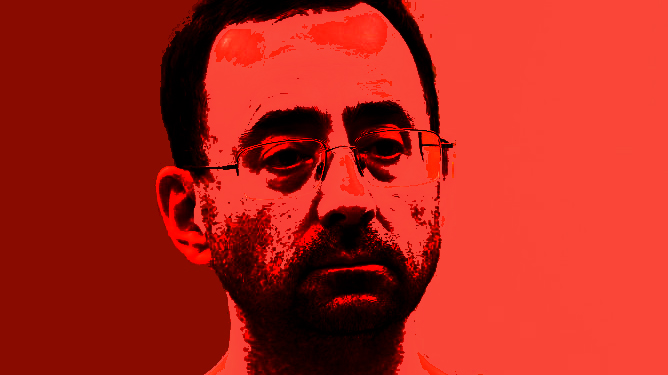
You wish Dr. Kate were your gynecologist. She’s an OB/GYN at one of the largest teaching hospitals in Boston who lectures nationally on women’s health issues and conducts research on reproductive health. She regularly (and generously!) answers your health questions here on EMandLO.com. The following on abusive doctors is part of a continuing series inspired by the #MeToo movement. To ask her your own med question, click here.
Regarding the Larry Nassar case, I’m so heartbroken and outraged that another person who took the Hippocratic oath could do this. And I shouldn’t be surprised. People in power abuse their positions all the time and of course doctors are some of those people. But it’s just so antithetical to what the rest of us believe in.
The Nassar case and the Aziz Ansari story are obviously two completely different situations — Nassar molested over 200 young girls who had no reason to suspect they were in danger: that’s a whole other disturbing ballgame. But they’re similar in one aspect: that women can be really surprised by the onset of an assault. You’re with someone that you think you can trust and it turns on a dime.
So first, don’t ever blame yourself for not reacting in the moment. When some kind of situation shifts that quickly, especially when you’re with someone you should trust, that shock may keep you from being able to react right away. A lot of people blame themselves later for not responding “in the right way.” But that shock is real when trust is being violated to that degree.
For the record, the only medical professionals who should ever be in your vagina are ob/gyns, family doctors and internists who can do pelvic exams, nurse practitioners, and midwives. I don’t know what excuses Nassar was giving with regards to his “therapy,” if he claimed he could address hip or back issues through the vagina or whatever — that’s bullshit. So if they’re not on that shortlist, they should not be in your vagina.
Know that every clinician should explain everything that they’re going to do before they do it. And if they’re old school and not used to communicating well, you have a right to politely yet firmly demand they explain everything they’re going to do and why they’re going to do it.
If you feel uncomfortable during an exam, because you feel like it’s taking too long or it’s not what you’ve been used to in the past, say something: “Hey, what’s up?” or “Is anything wrong, this seems to be taking a long time…?” Because if there’s an explanation, you’re going to feel better. Sometimes I’m really trying to figure out if there’s a cyst on a patient’s ovary and it’s taking a while. So I make sure that I look at her and say, “I’m not sure what I’m feeling here, this is why I’m doing XY and Z.” There may be a very good explanation for something, so if you ask and you get it, you’re going to feel a whole lot better. But if there isn’t any explanation, you know to leave and not return.
I’d also say trust your sense that something may be off, even before it turns physical. Meaning: you don’t have to wait to be assaulted before you say, “Okay, yeah, this is really bad.” Trust your Spidey sense that something is just not right in this encounter, whether it’s with doctors or dates or really any situation. And no explanation required. You don’t have to justify your feelings, and you don’t have to go back.
And specifically concerning doctors: whether it’s a physical doctor or a mental health professional (because you can be vulnerable with both), if your treatment feels a little off, again end it and don’t go back. You wouldn’t go back to a hair stylist if they didn’t listen to you and gave you a bad haircut. Just because doctors have credentials does not give them absolute power over you.

















So sad that this had to be written – but very well written, informative and sadly necessary.